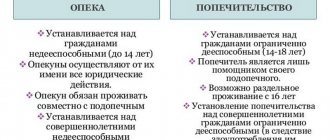Author of the article: Elena Petrenko Last modified: January 2020 10183
According to Federal Law No. 48-FZ dated April 24, 2008, guardianship of an incompetent person is established only by a capable person who has reached the age of majority. There are also other requirements for guardians, which anyone who plans to become the legal representative of an incapacitated person should be aware of.
Legislation
The entire procedure for registering guardianship - from the moment when an adult citizen is deprived of legal capacity until the moment when he is placed under guardianship - is provided for by law.
Main sources of legislation:
- Civil Code of the Russian Federation (Article 29 - recognition of a citizen as incompetent and appointment of a guardian, Article 32 - guardianship, Article 35 - appointment of a guardian, Article 40 - termination of guardianship, Article 41 - appointment of patronage);
- Federal Law of the Russian Federation “On guardianship and trusteeship” No. 48 dated April 24, 2008.
- Rules for the selection and training of guardians, Rules for concluding a guardianship agreement, Rules for verifying the place of residence of guardians and observing the rights of wards of incapacitated citizens, provided for by Decree of the Government of the Russian Federation No. 927, as amended. dated 12/21/2018 “On issues of guardianship and custody of adult incapacitated... citizens.”
Sample application to the court to recognize a citizen as incompetent
Before submitting the sample petition, there are a number of key points that need to be noted on the form. These include the following provisions:
- The petition does not indicate conflicts between the participants, therefore this form is not a claim.
- The document is required to display the exceptional information necessary to refer a sick person for examination, in order for the medical authority to conclude a conclusion regarding the identification of the level of his incapacity.
- The structure of the petition must contain the same sections as an ordinary application and the style of its preparation must be businesslike and consistent with the style of filling out official letters.
- The “header” of the form must display information about the addressee (name of the judicial structure), information about the applicant and the ward citizen.
- The text part should display all information about family ties with the person under guardianship and the request to assign the citizen incapacitated status with attached materials confirming the request.
- And of course, the document must display the date of its preparation and the signature of the applicant.
Features of guardianship over an adult incompetent citizen
A guardian is a citizen who is entrusted with perpetual responsibilities to care for, represent legitimate interests, and protect the rights of an adult citizen who, due to illness, injury, disorder, has lost the ability to understand the meaning of current events, make decisions and manage himself.
Appointment of guardianship (trusteeship) is possible only on the basis of a court decision on deprivation (limitation) of legal capacity (in accordance with Article 29 of the Civil Code of the Russian Federation).
Such a court decision entails the loss of the citizen’s right to enter into transactions, dispose of property, marry, change his place of residence, and represent his own interests in government bodies and non-governmental organizations.
All decisions in favor of a citizen deprived of legal capacity are made by his guardian.
Guardianship responsibilities are assigned to the guardian by a decision of a local authority or self-government - solely with his consent (in accordance with Article 35 of the Civil Code of the Russian Federation) after an inspection, review of documents, and a visit to the place of residence. Family ties between the guardian and the ward, as well as cohabitation with him, are not necessary, however, most often, it is the relatives who express a desire to take guardianship of a sick relative. To ensure that the guardian does not allow abuses and violations of the rights of the ward, representatives of the Guardianship and Trusteeship Authority (TCA) monitor, conduct checks, and review annual reports.
Guardianship: concept
According to current legislation, a person who has reached the age of majority is recognized as legally competent. He has the right to make transactions on his own behalf, represent his interests in court independently, deal with the preparation of documents in state and municipal bodies, as well as perform other actions on which his life depends.
Expert commentary
Kamensky Yuri
Lawyer
Until the age of 14, a child is considered legally incompetent. Parents or legal representatives make decisions for him; only his name appears in transactions. If a child turns 14 years old and is issued a passport, he is considered to have limited legal capacity and can independently enter into certain types of contracts with the written consent of his parents.
Guardianship is the placement of a minor or incompetent citizen under the guardianship of another person who meets the established criteria. This is done to ensure the legitimate interests of the ward. If a person is incapacitated, by law he is not entitled to enter into transactions. All transactions concluded on behalf of such a citizen after the establishment of incapacity are considered invalid and should not be allowed in the first place.
The appointment of a guardian is made by the guardianship authorities. This could be a close relative, friend, or even a stranger. The main condition is compliance with all criteria. Subsequently, such a citizen acquires all the rights and obligations of a guardian until the termination of the act of guardianship or indefinitely.
Rights and responsibilities of a guardian of an incapacitated citizen
If guardianship is established in relation to an incapacitated person, the guardian is vested with the following rights:
- Contacting government agencies to receive the benefits and payments due to the ward and the guardian himself.
- Protection of the interests of the ward in any instance.
- Taking all possible measures to ensure the safety of the property of the incapacitated person.
- Contacting health care institutions to receive medical services for those under care.
Expert commentary
Potapova Svetlana
Lawyer
According to the law, it is not allowed for a guardian to carry out transactions with the property of an incapacitated person without the permission of the guardianship authorities. To obtain it, you will have to prove the feasibility of such operations.
In addition to rights, guardians are also assigned specific responsibilities:
- Purchasing food, shoes and clothing for the ward in order to provide him with a full life.
- Monitoring the health and hygiene of the incapacitated person.
- Protection and preservation of existing property.
- Upholding the rights of the ward in any situation.
- Fulfillment of obligations on behalf of the ward.
- Correct management of government payments to the ward. In most cases, the POiP will require the provision of reports, so you will not be able to spend the pension or other income of the person under your care on yourself.
If guardianship is established over a minor child, the guardian’s additional responsibilities include monitoring school performance, ensuring comprehensive development and timely medical examination.
Who can become a guardian?
Since a citizen who has lost his legal capacity needs not only everyday household care such as cooking and buying medicine, but also legal representation and protection of rights, not everyone can be a guardian .
Requirements for guardians are established by Art. 35 Civil Code of the Russian Federation, Art. 10 Federal Law “On Guardianship...”, as well as “Rules for the selection and training of guardians...”.
Primary requirements:
- Full legal capacity.
- Age of majority.
- Absence of diseases such as cancer, tuberculosis, infectious diseases, drug and alcohol addiction, mental disorders (according to Russian Government Decree No. 117 of 02/14/13).
- Lack of court decisions on deprivation of parental rights.
- No criminal record for crimes against the person.
- Availability of housing (at full disposal or use).
The requirements for guardians of adult citizens are not as strict as the requirements for guardians of small children deprived of parental care. For example, a guardian of an incapacitated citizen does not necessarily have to have a regular source of income.
In addition, caring for a sick adult can take a lot of time and effort.
According to Decree of the Government of the Russian Federation No. 343 “On monthly compensation payments...” and Decree of the President of the Russian Federation No. 1455 “On compensation payments...”, he can count on a monthly payment of 1,200 rubles , and according to Art. 16 of the Federal Law “On Guardianship...” - can conclude an agreement on paid guardianship with the PLO.
Contents of the statement
To understand what information needs to be written, consider a sample application to the guardianship authorities. Like any application to a local government authority, an application for guardianship consists of 3 parts.
A cap
The header is information that is located in the upper right corner and contains:
- Data from the head of local government.
- Applicant details.
The head of the guardianship authority is usually the head of local government (head of the district or administration, mayor).
In the information about the applicant, we indicate the last name, first name, patronymic, date of birth, residential address, passport details, telephone number.
Information and petition part
The content of the main part of the application consists of:
- Requests to be appointed guardian.
- Reasons for the device.
- Data of the incapacitated person.
- Determining the form of guardianship.
- Information about the candidate’s compliance with legal requirements.
Unlike most petitions, the request for appointment as guardian must be stated at the beginning of the petition. Be sure to indicate the details of the applicant and the person in need of assistance.
As the basis for the device, it is necessary to register the details of the document (court decisions on deprivation of parental rights, on recognition as incapacitated, a statement from mom and dad).
The text of the petition must indicate whether the citizen has chosen a paid or gratuitous form of guardianship. During the performance of duties, it is possible to change the type of device.
The application form already contains a test about the compliance of the applicant’s living conditions, financial condition, health, and work schedule with the requirements of the law. In addition, it is necessary to provide additional information about experience in similar activities, education, completion of specialized courses, positive recommendations or characteristics.
Final part
Typically, the petition ends with the date the document was drawn up, the signature of the applicant and a description of the application. This business paper does not provide a list of attached documents.
The application additionally contains consent to the processing of personal data. To write an application to the guardianship authorities, you must be guided by the information from the prepared documents.
Rights and responsibilities of a guardian
The list of rights and responsibilities vested in the guardian of an adult incapacitated person are interconnected and strictly defined by law (Article 15 of the Federal Law “On Guardianship...”, Article 36 of the Civil Code of the Russian Federation):
- protect the legitimate interests of the ward in government bodies and court;
- dispose of the ward’s property with the permission of the PLO (ensure safety, transfer for use, lease - in agreement with the PLO);
- fulfill the financial obligations of the ward (pay loans, utility bills, taxes);
- manage the income of the ward (receive a pension, social benefits, payments);
- make everyday purchases for the ward: food, hygiene items, medicines;
- take care of, provide household assistance: cook, maintain cleanliness;
- promote the recovery of the ward, accompany him to medical examinations, carry out medical orders;
- file a lawsuit or petition to restore the legal capacity of the ward;
- submit petitions for calculation of payments, collection of alimony, allocation of benefits, provision of material support in the interests of the ward;
Removal of guardianship
There are only a few reasons for revoking guardianship powers:
- death of an incapacitated citizen or guardian;
- failure to perform or abuse of one's duties;
- the child reaches adulthood;
- recognition by the court of the legal capacity of the ward.
The guardian has the right to independently file an application to the court to remove his authority. Additionally, expense reports and reasons for approval of the case are provided.
A person with mental problems or a child under 18 years of age is considered incompetent. In both cases, guardianship is issued. A candidate wishing to obtain guardianship rights and responsibilities must submit the necessary package of documents to the OOP along with a correctly completed application. After studying the provided certificates and analyzing the living conditions, the guardianship authorities will make their choice. In the future, they will monitor the actions of the appointed guardian.
The procedure for registering guardianship
As mentioned above, before starting the procedure for appointing guardianship (trusteeship), you need to obtain a court decision on deprivation (or restriction) of legal capacity (in accordance with Article 29 of the Civil Code of the Russian Federation).
Follow this procedure:
- Filing an application to the court to declare a citizen incompetent;
- Obtaining a court decision;
- Submitting an application for the appointment of guardianship to the Guardianship and Trusteeship Authority;
- Preparation of supporting documents;
- Checking by a representative of the PLO the place of residence of the guardian;
- Obtaining a conclusion from the OOP and a decision on the appointment of guardianship.
The specifics of the procedure for appointing guardianship are provided for by the Decree of the Government of the Russian Federation dated No. 927, as amended. dated 12/21/2018.
Recognition of incapacity
The procedure for appointing guardianship is necessarily preceded by a judicial process declaring a citizen incompetent (Chapter 31 of the Code of Civil Procedure of the Russian Federation).
Only a court is authorized to recognize a citizen as incompetent - based on an application submitted on behalf of...
- close relatives of a citizen (husband or wife, parents, children, brothers or sisters) regardless of joint or separate residence;
- representative of the PLO;
- representative of a medical or social organization (clause 2 of article 281 of the Code of Civil Procedure).
An application must be submitted to the court at the place of residence of the mentally ill citizen, and if he is in a medical institution, at the location of this medical institution (clause 4 of Article 281 of the Code of Civil Procedure).
The application must contain circumstances that confirm the need for guardianship: mental disorder, inability to understand the meaning of what is happening, make decisions, fulfill obligations, manage funds and property (clause 2 of Article 281 of the Code of Civil Procedure of the Russian Federation).
The prosecutor and a representative of the PLO, as well as the citizen himself, in respect of whom the case is being considered, must take part in the trial, if his presence in the court hearing is not dangerous for himself and for others.
During the trial, a forensic psychiatric examination is (Article 283 of the Code of Civil Procedure of the Russian Federation). Based on the results of the expert opinion and other documentary evidence (medical certificates, extracts from the medical history, characteristics and witness statements), the court makes a decision .
A court decision is the basis for the appointment of guardianship (Article 285 of the Code of Civil Procedure of the Russian Federation).
Contacting the guardianship department
Within 30 days after the court decision on deprivation of legal capacity enters into force, guardianship must be assigned to the citizen (Clause 2 of Article 11 of the Federal Law “On Guardianship...”).
However, a mandatory condition for appointing guardianship is the voluntary consent of the guardian. A citizen who wants to become a guardian must personally contact the PIO and submit an application - this serves as an expression of his consent and intention.
If none of the relatives or strangers submits a statement of intent and consent to become a guardian, guardianship responsibilities are assigned to the state represented by the PLO. A citizen can also be placed in a medical institution for treatment, care, observation.
Submitting an application
Expert opinion
Semyon Frolov
Lawyer. 7 years of experience. Specialization: family, inheritance, housing law.
The law does not contain a single unified form of declaration of intent to become a guardian for a citizen deprived of legal capacity.
Below you can see a sample application prepared by lawyers. However, before filling out and submitting an application according to the proposed sample, we recommend that you seek advice from the Public Organization - perhaps representatives of the local government apply local standards and use their own sample application.
The application must contain the following information:
- name and address of the Guardianship and Trusteeship Authority;
- applicant details: full name, date of birth, address;
- “Statement of Intent to Become a Guardian”;
- details of the ward: full name, date of birth, address;
- data of the court decision by which the ward was declared incompetent (name of the court, date, number);
- data on the relationship between the applicant (guardian) and the ward;
- other data;
- request for guardianship;
- date of;
- signature.
You can submit an application in one of the following ways:
- through OOP;
- through the MFC;
- through the Unified Portal of State Services.
The first two methods involve submitting an application in writing (according to the sample provided by a PLO representative or an MFC employee) with the applicant’s handwritten signature. The last method involves filling out an electronic application form using an electronic signature.
Check at place of residence
Having received the application, the representative of the PLO is obliged to visit the guardian at his place of permanent residence:
- inspect the living quarters (if it is assumed that the ward will live with a guardian);
- assess the personal qualities of the guardian, verify his motives and intentions.
The verification period is 5 days after receipt of the application. The conclusions that representatives of the PLO make based on the results of the visit are drawn up in the form of an Act and are taken into account when making a decision on the appointment of guardianship.
Conclusions of OOP. Appointment of guardianship
After reviewing the submitted documents, meeting the guardian and inspecting his living quarters, representatives of the PLO issue a conclusion...
- about the possibility of being a guardian of an incapacitated citizen;
- about refusal.
A positive conclusion retains legal force 2 years and serves as the basis for the appointment of guardianship . A negative conclusion can be appealed in court.
The decision to appoint guardianship is made by the government or self-government body at the place of residence of the incapacitated citizen.
Consideration of the application
The guardianship and trusteeship authority will respond within 10 days. During this time, specialists must visit the citizen’s home to inspect living conditions. The result of the review is a conclusion on the possibility of being a guardian, and if violations are detected, a refusal to appoint. If the outcome is unfavorable, the citizen can file a claim in court to appeal the act.
If the candidate has already decided on the identity of the ward, then the guardianship department can immediately issue an act on the appointment of a trustee. After this, the social authorities are entrusted with the function of verifying the proper performance of the guardian’s duties.
If a citizen believes that his rights were violated during the consideration of the application, he can seek protection from a higher organization or the prosecutor's office.
The filing of a petition with the guardianship authorities marks the end of the preparatory process. By drawing up an application, a citizen assumes great responsibility for the life, health and property of people who need it.
List of documents
The full list of documents that need to be submitted to the PLO is listed in the “Rules for the selection and training of guardians...”, which are approved by Decree of the Government of the Russian Federation No. 927, as amended. dated 12/21/2018.
The list of documents depends on the relationship between the guardian and the ward.
If the guardian is a close relative of the ward (father or mother, son or daughter, brother or sister), and/or has lived with him for the last 10 years , the list of documents includes:
- statement;
- a copy of the guardian's passport;
- a copy of the marriage certificate (if the guardian is married);
- document confirming relationship (birth certificate, marriage certificate);
- medical report on the health status of the guardian.
If the guardian is an outsider in relation to the ward , the list of documents expands and includes:
- statement;
- copy of the guardian's passport;
- a copy of the marriage certificate (if the guardian is married);
- autobiography;
- certificate of employment, position held, salary for the last 12 months;
- a copy of the pension certificate;
- medical report on the health status of the guardian;
- written consent of all family members (adults and children over 10 years old) living with the guardian, if it is expected that the ward will reap with them;
- certificate of completion of a training course for caregivers.
In addition to the listed documents, OOP requests additional data:
- certificate of place of residence;
- a certificate about the sanitary and technical condition of the guardian’s living quarters;
- certificate of pension amount;
- certificate of presence or absence of criminal record.
Who can file an application for incapacity?
A petition to the judicial structure to determine a citizen’s status as incompetent can be sent to categories of persons in accordance with the provisions established by the legislation of the Russian Federation. This list includes the following persons:
- Person's relatives (parents, husband or wife, children, sisters and brothers, etc.)
- Persons living with an incapacitated individual in a shared living space (cohabitants).
- Employees of the Board of Trustees.
- Specialists from medical institutions and boarding schools for persons with disabilities.
Payments, benefits, benefits
Many people are quite rightly interested in the question: how much does a guardian earn?
- If guardianship is awarded gratuitously or daughter), the guardian does not receive any payment or compensation.
- If guardianship is appointed on a paid basis , the guardian may enter into a paid guardianship agreement , according to which he will receive monthly payments of the established amount. The source of payments can be the local budget or the income of the ward (no more than 5%).
This procedure is provided for in Art. 16 Federal Law “On guardianship...” and “Rules for concluding an agreement on paid guardianship...”, approved. Decree of the Government of the Russian Federation No. 927 as amended. dated 12/21/2018.
Another source of state support is an additional payment to the ward’s pension, intended for a guardian who...
- is of working age (man up to 60 years old, woman up to 55 years old);
- not employed;
- does not receive any income;
- takes care of an elderly or sick person in need of constant care (according to a doctor’s opinion), an elderly person over 80 years old, a disabled person of group 1 (except for disabled people from childhood). Family connection or cohabitation with the ward does not matter.
The benefit amount is 1200 rubles.
This is provided for by the Decree of the Government of the Russian Federation “On monthly compensation payments...” No. 343, as amended. dated October 30, 2018 and the Decree of the President of the Russian Federation “On compensation payments...” No. 1455, as amended. dated 12/31/2014.
In addition to the monetary supplement, the guardian is accrued seniority for the entire period of performance of guardianship duties.
Unfortunately, at the federal level, caregivers of sick or elderly adults are deprived of additional government support. But some local regulations or orders of government and self-government bodies provide for additional benefits, privileges, payments and allowances. For example, in some cities, with a guardian’s certificate, you can receive the right to free travel on public transport, financial assistance in the form of medicines or hygiene products, and a discount on utility bills.
The law does not oblige the guardian to support the ward at his own expense. For all expenses for maintaining the ward, you can use his own funds - pension, social benefits, alimony, which go to the guardian’s account and are at his disposal. At the same time, the guardian does not have the right to spend the ward’s funds for personal gain, use his property (without the permission of the PLO), or dispose of his property. Also, the guardian has no right to demand payment or remuneration from the ward.
The guardian is obliged to report annually to the PLO on the expenditure of funds and the disposal of the ward’s property.
Features of guardianship
To establish a good relationship between the person with guardianship rights and the ward, it is necessary to interview friends, relatives and neighbors. They will talk about the preferences of the incapacitated person. Based on the information received, it will be easier for the guardian to fulfill his duties.
Depending on the situation, certain nuances are possible:
- Guardianship of an incapacitated elderly person is appointed based on a court order. In most cases, the ward is an elderly pensioner (over 80 years old) who does not have any special mental problems, but for health reasons needs constant care. The role of the PLO representative will be to improve everyday life and monitor the implementation of doctors’ recommendations.
- Registration of guardianship over an incapacitated relative begins with the submission of an application to the guardianship authorities. The review procedure is similar to the standard one. If there are several candidates, the choice will be made in favor of a relative, since it will be easier for the warded citizen to establish contact with him.
- Care for people with disabilities is required depending on the cause and degree of disability. The first group is given to people suffering from schizophrenia. They are recognized as completely incompetent, which is the basis for guardianship.
- If the mother or father loses legal capacity, the child's own child may become the guardian. If children do not have the opportunity to care for elderly parents, then they have the right to look for other persons who will agree to assume similar responsibilities.
- It is possible to become a guardian for a person who does not have Russian citizenship, but you will have to contact the consulate of his home country to resolve this issue. The norms and laws by which the PLO operates apply only to citizens of the Russian Federation, therefore applications for guardianship to a foreigner are immediately rejected.
Responsibility of a guardian for the actions of an incapacitated ward
The guardian is obliged to compensate for the harm that an incompetent person caused to strangers (according to Article 1076 of the Civil Code of the Russian Federation). This means that the guardian bears material (but not administrative or criminal!) responsibility for the conscious and unconscious actions of the ward.
Example 1 The guardian of the incapacitated Prokhorov is his nephew Semenov. During his nephew's absence, Prokhorov decided to start cleaning up the apartment and began throwing unnecessary things out of the window. A large and heavy object hit a car parked under the windows of Prokhorov’s apartment. The owner of the car filed a lawsuit for compensation for the damage caused.
The exception is when the guardian can prove that the harm was not caused by the fault of the ward.
Example 2 An elderly Berezovsky, whose guardian his granddaughter Victoria was appointed, accidentally stumbled upon a rack of bottles standing between the display cases in the aisle of the store. The bottles broke. The store administrator demanded compensation from the guardian for the damage caused. However, Victoria refused to pay for the broken goods. In the trial, the guardian managed to prove that the reason was not the guilty actions of the incapacitated Berezovsky, but the incorrect location of the rack, which blocked the passage and violated safety standards in the store.
Grounds for filing an application for recognition as incompetent
Determining an individual as incompetent is a responsible undertaking, since with a positive decision by the judicial structure, transactions can be carried out for the sale and purchase of the incapacitated person’s real estate by third parties.
Pension and other social payments may be made in favor of the guardian of an incapacitated person. Upon receipt of this status, a person is deprived of the opportunity to dispose of his property, however, this does not deprive him of the legal right to own his property. To determine the complete or partial incapacity of a citizen, the following grounds are required:
- Weakening of legal capacity when a person reaches a certain age (very old age).
- Serious mental illness that does not provide an adequate response to the situation (this diagnosis must be confirmed by a medical examination).
- Partial loss of legal capacity, when it occurs, a person is able to understand his activities, but is not able to control it. At the court hearing, a strong-willed approach is emphasized.
Any of the listed circumstances may become the basis for declaring a citizen incompetent status during judicial consideration of the application. In this case, the applicant is required to present medical and legal materials confirming the need for designation of incapacity.
Pros and cons of guardianship
Taking care of a person who is not aware of what is happening and does not control himself is hard work. As a rule, only the closest people - relatives, close friends, neighbors who have lived nearby for many years - can bear the responsibility of caring for such a person. Therefore, representatives are predominantly relatives.
Let's look at what guardianship provides and what additional difficulties it brings to the guardian.
Pros of guardianship:
- The ability to preserve the habitual place and way of life for the ward;
- The opportunity to personally care for the person under your care or hire a caregiver or nurse - and be confident in quality care;
- Possibility of living together in the guardian’s living quarters, which in some cases helps resolve difficult housing situations;
- Seniority;
- Receiving sums of money from the ward (alimony, pensions, payments) credited to the guardian’s account and disposing of the funds in the interests of the ward;
- The ability to make all important legal, everyday and material decisions on behalf of the ward (in exceptional cases - with prior agreement with the PLO);
Cons of guardianship:
- High level of physical and mental stress;
- The obligation to report on the expenditure of funds belonging to the ward and the disposal of his property;
- Willingness to undergo regular inspections by the PLO.
Some relatives and friends of an elderly or sick person begin to formalize guardianship, expecting to receive an inheritance after the death of the ward. However, according to the law, guardians have the right to claim inheritance after the death of the ward (except for close relatives who are heirs by law). A guardian can claim an inheritance under a will only if the will was drawn up before the court decision on deprivation of legal capacity - in his right mind.
Expert opinion
Dmitry Nosikov
Lawyer. Specialization: family and housing law.
As you can see, the procedure for registering guardianship is not too complicated, if there are reasons for it - a mental state in which a person is not able to independently take care of himself, act consciously, and make informed and reasonable decisions. However, the consequence of registration of guardianship will be a number of additional responsibilities and extremely little government support.
In the vast majority of cases, the guardian or trustee takes care of a helpless loved one completely unselfishly.
Perhaps you have some unresolved questions?
Do you need individual advice or legal assistance? Describe the situation in the 24-hour legal support chat or call the hotline - our lawyer will advise you free of charge on all questions that interest you. Attention!
- Due to frequent changes in legislation, information sometimes becomes outdated faster than we can update it on the website.
- All cases are very individual and depend on many factors. Basic information does not guarantee a solution to your specific problems.
That's why FREE expert consultants work for you around the clock!
- via the form (below), or via online chat
- Call the hotline:
- Moscow and the Region
- St. Petersburg and region
- FREE for a lawyer!
By submitting data you agree to the Consent to PD Processing, PD Processing Policy and User Agreement.
Anonymously
Information about you will not be disclosed
Fast
Fill out the form and a lawyer will contact you within 5 minutes
Tell your friends
Rate ( 1 ratings, average: 5.00 out of 5)
Author of the article
Irina Garmash
Family law consultant.
Author's rating
Articles written
612
The property of the ward and his rights
It is worth immediately determining what property an incapacitated citizen can own.
- Real estate. Some people mistakenly believe that children cannot own real estate. This is not true, they can inherit the apartment after the death of their parents, becoming its owners.
- Bank accounts. Often parents or other relatives open deposits for their children, which they can use after they reach 18 years of age. It should be borne in mind that no one except the child can dispose of the deposit, even the person who opened it.
- Movable property. This category includes cars, valuables, household appliances, etc.
According to the law, a ward cannot dispose of everything that belongs to him until he reaches adulthood, that is, until he acquires full legal capacity. However, he has the right to use his property.
Important! The concepts of incompetent and insane cannot be combined, as it has a broader meaning. In the Russian Federation, children who have not reached the age of majority have the status of an incompetent citizen. In addition, this category includes people recognized by the court as mentally ill.
Example. Minor P, yielding to the persuasion of his neighbor, sold the moped that belonged to him by right of inheritance to his neighbor. However, his grandfather, who was the guardian, learned about this situation and protested the deal in accordance with the procedure established by law. After considering the case, a decision was made to cancel the transaction, since it was carried out in violation of the law. The money and the moped were returned to the owners.
Relationship Basics
The subjective relations that develop between the guardian and the ward are based on mutual rights established by the state. At the same time, minor children have much more of them than their legal representatives.
In this case, only personal non-property legal relations arise between them. A property nature is unusual for guardianship. Any material assets remain the property of each of them, regardless of the circumstances and duration of social care. Wherein:
- They may have joint property.
- In some cases, the guardian may claim the inheritance.
- The wards can use the things of the official representative, but only with his consent.
- The guardian has no right to use the property of a minor for his personal (including commercial) purposes.
Obligation to register
The legal representative and the ward can live together. But this does not mean that the guardian is obliged to register a child or adult (whose incompetence has been established in court) in his apartment. In this case, guardianship can be provided without actual registration in the residential premises.
Exception: a minor does not have a residence permit. By law, children must have a place of residence. In his absence, the guardian is obliged to register the teenager. This need also arises in situations in which people move to another city. In this case, you need to inform the guardianship authority about the change of residence.
Sometimes the legal representative lives with the ward. In this case, in the same way, the obligation to register in the apartment does not arise. But at the request of the parties, both a guardian and a minor can be registered.








